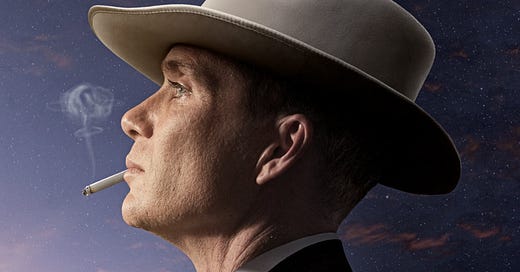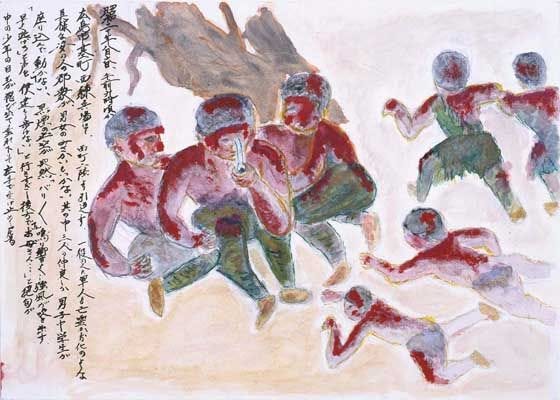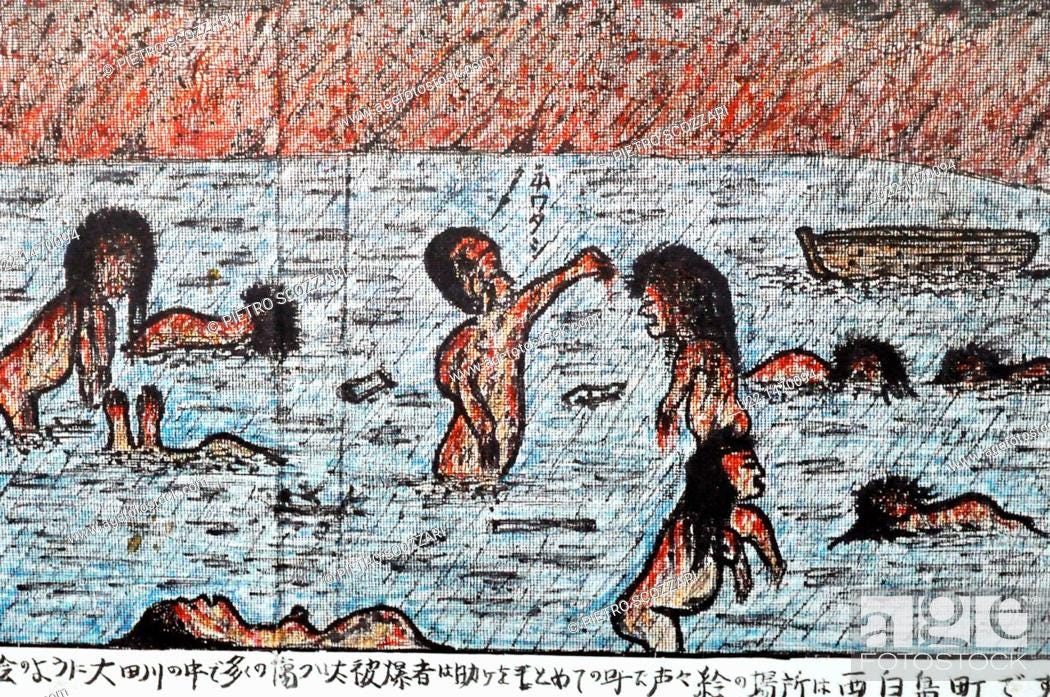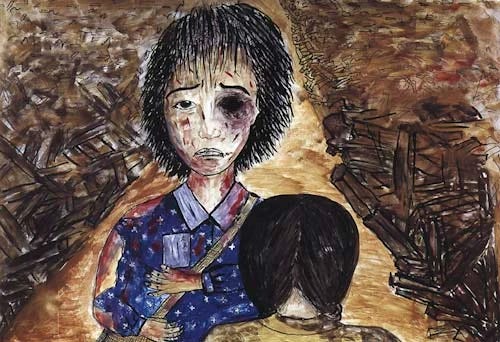CW- True War descriptions
OK. I have some problems with the recent release of Oppenheimer, as I think anyone Japanese or Japanese American might. I’ve been to the Peace Park in Hiroshima where my family and I spent a morning weeping as we walked through the park and the museum documenting one of the worst mass executions of innocent people in arguably the most horrific way: The nuclear bomb.
The lucky ones were instantly vaporized near the center of the burst. Those on the edges had their eyes explode and their skin melt off. Still alive they stumbled around trying to find relief for the burning, throwing themselves into the city’s river, only to be boiled alive by the water which the bomb had heated to hundreds of degrees. The rest were like zombies, walking dead with the effects of radiation. Families scrambled to find each other. Very few did. People wrote on buildings and school walls desperately asking if anyone had seen their loved ones.
At the park is an artist’s rendering of stories from survivors, or at least people who survived the following days and months. In one of the drawings, there is a small child that appears to be crying as he leans face first into a wall. He’s naked because the bomb burned off his clothes. The man telling the story says he went to console the boy and help him find his parents, only to discover the boy had died against that wall, crying and suffering
The story that really got me was told by a man who survived. He had been working far enough from the bomb to suffer milder effects, and he spent the day frantically looking for his wife and kids who were in the city when the bomb hit. He found them, burned and battered, but alive. But they had nowhere to go. He described feeling so happy being together with his family, knowing so many were still searching. That night, they went to sleep on a hill and looked up at the stars, likely trying to wrap their heads around the horrors they had seen. When the man heard his young daughter ask if he and her mom were still there because she couldn’t see, he said he knew she was dying. The parents assured her they were right next to her and told her to sleep. They awoke in the morning to find the child had died sometime during the night. Their only solace was that they had had one last night together as a family
And after the US military surveyed and documented the destruction and horrors the Hiroshima people endured, they dropped an even bigger bomb on Nagasaki.
To me, this is what Oppenheimer should be remembered for. But as things go in this country and for White people here, Hollywood has lionized him as a complicated genius who felt bad for what he did. Poor guy. I’ve read glowing reviews of the movie. I’ve heard from my kids, who saw it along with their cinephile friends, saying that it lacked emotional impact, favoring cinematography and a few impactful scenes over an ethical story arc. Some even lamented that there was too much sex and nudity for a movie about a guy who invented the most cruel, inhumane device ever.
To me, that’s the point. Oppenheimer, the man, is depicted as living a privileged life. A whole one, in which he received the best education, used it to achieve his dreams, made love to many women, and GOT to live out his days decrying the very thing he had dedicated his life to. Meanwhile the survivors, the downwinders in the American desert and the people of Southern Japan have suffered health issues, scorched branches of their family trees, and nightmarish memories that will haunt them for generations. None of which is depicted in Oppenheimer outside of some faceless, identity-less images in dreams. This is White privilege. Instead of being remembered as the monster he admits to being, he’ll be remembered as an Oscar-nominated character with amazing soundtrack, sound design, costuming, and superb acting by talented actors. Don’t believe me? The movie posters have him depicted in front of fire or grey skies with the words, “Destroyer of Worlds.” Thanos much? For White Americans, Hollywood is asking them to both marvel and wonder at the lived experiences of a scientific genius and at the same time marvel at the magnitude and scope of the destruction he helped cause. And then they can sympathize and wonder at what it would be like to be someone like Oppenheimer. A genius with a vision. Virile lover of beautiful women. And then a would-be moral compass that went unheeded by the political leaders of the world. The bombs were unfortunate symptoms of a quest for excellence, peace, and notoriety for White people. Hey. It happens, and Hollywood is asking us to focus on that. Erasure of Japanese and poor desert-dwelling Americans in favor of White-centered Hollywood magic. Apparently, the movie has prompted the Senate to pass a resolution compensating the families in the desert, which is great. Movies provide power and capital in this world. For some.
For the Japanese, they imagine themselves or loved ones vaporized or slowly burning to death at the hands of someone like Oppenheimer. For me, someone between Japan and America, all I picture when I see the name Oppenheimer are shadows burned into school walls, blood and melted flesh on children crying out to the heavens and to their parents.
So, as Hollywood asks you to watch a movie, paired humorously with Barbie, and consider those who worked on it for prestigious, life-changing awards, I’m asking you to also think of those who suffered and died as a result of a man’s research and a government’s view that Japanese people and poor Americans are not humans deserving life.
.










This is a powerful piece, thanks for sharing this. It's always crucial to keep in the front of our minds, when watching films like these, the absolute horror and tragedy caused by people like Oppenheimer. I appreciate this convicting perspective you shared.
Didn't think I needed to cry today. Guess I was wrong about that.